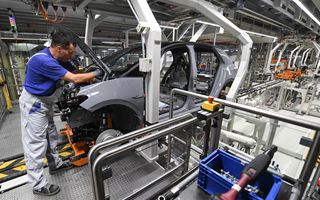(Finance) – The German locomotive is slowing down, largely due to the auto crisis, which is slowing down investments, weighing on consumer sentiment and is reflected in the rest of Europe, not least Italy, which is Germany’s main trading partner. This was discussed in the last Ecopill the economist Andrea Ferretti.
1- The situation
There situation of the German economywhich had already shown signs of some fatigue in the post-Covid recovery, significantly worsened in 2023, when Germany was the only one among the main European countries to close the year with a GDP in negative territory (-0.3%) against a Eurozone growth of 0.4%. The problem is that even the 2024 data show no signs of recovery: in the second quarter of 2024, German GDP slipped back into negative territory (-0.1%) and, in July, industrial production fell by 2.4% compared to the previous month. In this scenario, all the main institutional observers predict a 2024 GDP with zero growth or little more.
2- The reasons
The reasons for German stagnation are essentially three.
The first reason concerns the cost side: the war in Ukraine and the embargo measures taken by Europe against Russia have caused the energy costs of German heavy industry, which is particularly energy-intensive, because the particularly privileged contracts that Germany had stipulated with Russia for the supply of oil and gas have ceased to exist.
The second reason concerns the automotive sector crisis. The point is that this sector, particularly important in the German economy, is like a panzer, very fearsome, but very heavy and not very agile in sudden movements. The problem is that the automotive panzer, just as it was laboriously progressing towards a Transition to Electric imposed from above and unsustainable, found itself, on the one hand, bogged down in the crisis of the European automotive sector. On the other, subjected to increasingly incisive attacks by Chinese competitorsabundantly funded by the government and much more agile in the transition to green engines. And even the European duties on Chinese cars would not help German manufacturers particularly, as the Chinese retaliation to these duties would hit precisely the high-end cars coming from Germany. 25% of Porsches and 36% of Mercedes are in fact sold in China.
The third reason concerns the internal consumption: the stagnation of industry in Germany has triggered a general crisis of mistrust. The problem is that this crisis of mistrust, also fueled by thepolitical uncertaintyon the one hand it has led industries to reduce investments and employment, but on the other it has led workers-consumers to reduce internal consumption as a precaution, thus triggering a dangerous vicious circle; emblematic in this regard is the threatened closure of a Volkswagen plant, with the consequent redundancy of thousands of workers.
And, obviously, all this cannot leave us indifferent, given that the Germany is our main trading partner with 74 billion in exports, of which 26 billion destined for the German automotive sector.
